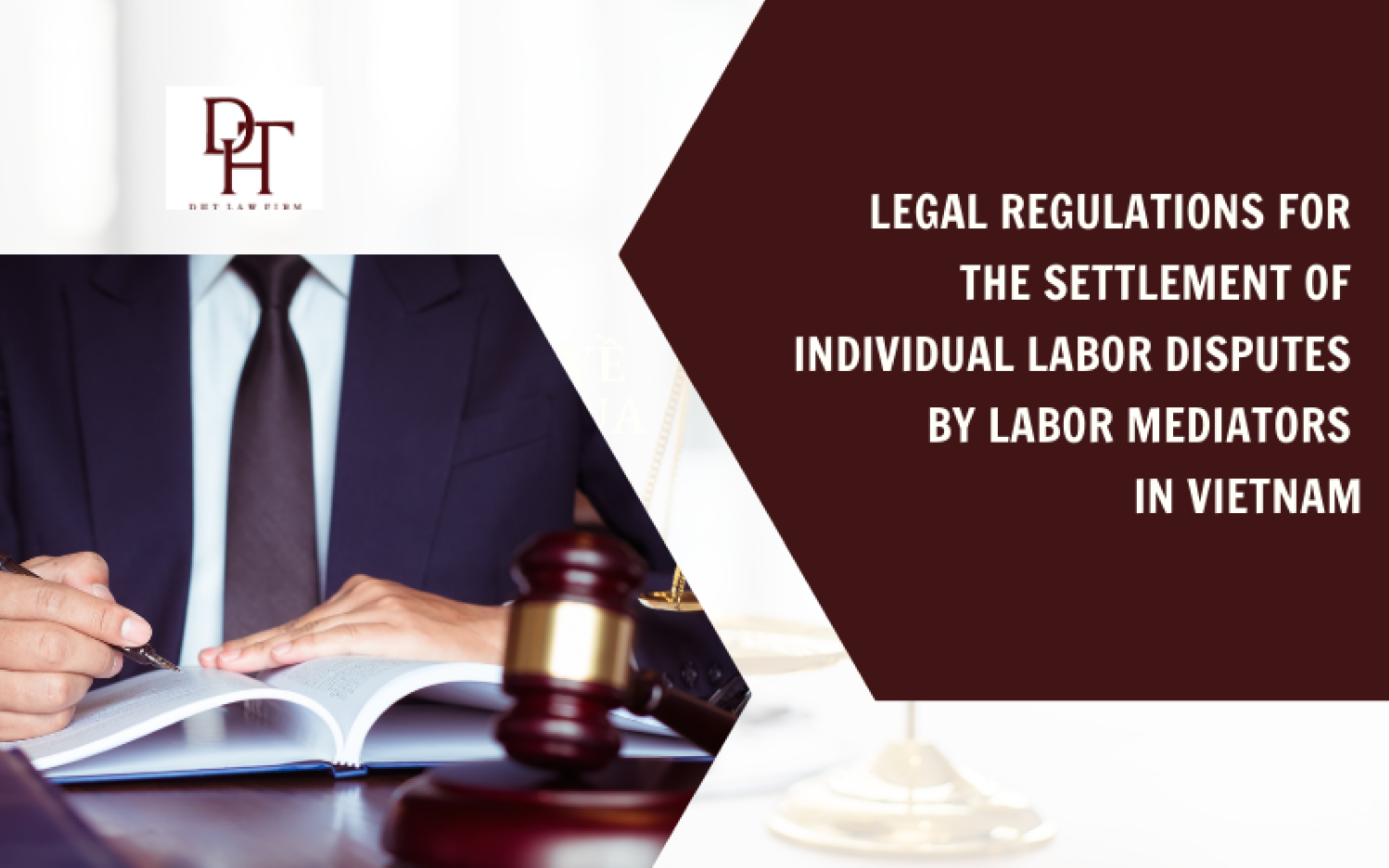
LEGAL REGULATIONS FOR THE SETTLEMENT OF INDIVIDUAL LABOR DISPUTES BY LABOR MEDIATORS IN VIETNAM
The labor relationship is a unique kind of relationship among those that appear, exist, and are acknowledged in the market economy because it combines individual and collective economic and social relations. Labor conflicts are becoming increasingly common in the present environment, making their resolution an indispensable requirement. The settlement of labor disputes through mediation is a crucial topic. Within the scope of the article below, Dai Ha Thanh Law Firm will provide clients with "Legal regulations for the settlement of individual labor disputes by labor mediators in Vietnam".
- Overview of the settlement of individual labor disputes by labor mediators in Vietnam
- Individual labor disputes
According to the provisions of Clause 1, Article 179 of the Labor Code 2019, “A labor dispute means a dispute over rights, obligations and interests among the parties during the establishment, execution or termination of labor relation; a dispute between the representative organizations of employees; a dispute over a relationship that is directly relevant to the labor relation”.
Individual labor disputes are labor disputes between the employee and the employer; between the employee and the organization that sends the employee to work overseas under a contract; between the outsourced worker and the client enterprise.
- Competence to settle individual labor disputes in Vietnam
According to Article 187 of the Labor Code 2019, the following agencies, organizations and individuals have the competence to settle individual labor disputes:
- Labor mediators;
- Labor Arbitration Councils;
- The People’s Court.
- The settlement of individual labor disputes by labor mediators
Pursuant to Clause 1, Article 184 of the Labor Code 2019 stipulates that “Labor mediators shall be assigned by the President of the People’s Committee of the province to mediate labor disputes and disputes over vocational training contracts; assist in development of labor relations”.
Mediation is a method of resolving disputes in which an independent third party, namely a mediator, assists disputing parties in identifying the issues at the dispute and attempting to reach an agreement.
Mediation through a labor mediator is a process for settling labor disputes that is carried out by an impartial third party who serves as a labor mediator and is responsible for assisting the disputing parties in their negotiations to reach a settlement.
- Principles of the settlement of individual labor disputes by labor mediators
Mediation is a method of resolving labor disputes, hence this activity must also comply with the principles specified in Article 180 of the Labor Code 2019. Specifically, the five principles are as follows:
First principle: Respect the parties’ autonomy through negotiation throughout the process of labor dispute settlement.
Second principle: Prioritize labor dispute settlement through mediation and arbitration on the basis of respect for the rights and interests of the two disputing parties, and respect for the public interest of the society and conformity with the law.
Third principle: The labor dispute shall be settled publicly, transparently, objectively, promptly, and lawfully.
Fourth principle: Ensure the participation of the representatives of each party in the labor dispute settlement process.
Fifth principle: Labor dispute settlement shall be initiated by a competent authority or person after it is requested by a disputing party or by another competent authority or person and is agreed by the disputing parties.
II. Legal regulations for the settlement of individual labor disputes by labor mediators
- The subject of mediation implementation
Article 187 of the Labor Code 2019 stipulates that the labor mediator is one of the competent subjects to resolve labor disputes. Therefore, mediation in resolving individual labor disputes is conducted by the Labor Mediator.
Article 92 of Decree 145/2020/ND-CP stipulates the labor mediator standards as follows:
- Be a Vietnamese citizen; have full legal capacity as prescribed by the Labor Code, good health and moral qualities.
- Have at least a bachelor’s degree and 03 years’ experience in a field relevant to labor relations.
- Not be facing criminal prosecution; not have any unspent conviction.
- Scope of labor mediation
According to the provisions of Clause 1, Article 188 of the Labor Code 2019, individual labor disputes shall be settled through mediation by labor mediators before being brought to the Labor Arbitration Council or the Court. Therefore, it can be drawn as a general principle that all individual labor disputes must go through the procedure of a labor mediator.
However, mediation is not required for the following 06 cases of labor disputes:
- Disputes over dismissal for disciplinary reasons; unilateral termination of employment contracts;
- Disputes over damages and allowances upon termination of employment contracts;
- Disputes between a domestic worker and his/her employer;
- Disputes over social insurance in accordance with social insurance laws; disputes over health insurance in accordance with health insurance laws ; disputes over unemployment insurance in accordance with employment laws; disputes over insurance for occupational accidents and occupational disease in accordance with occupational safety and health laws;
- Disputes over damages between an employee and organization that dispatches the employee to work overseas under a contract;
- Disputes between the outsourced worker and the client enterprise.
- Sequence and procedures for the settlement of individual labor disputes by labor mediators

Step 1: File a request for mediation
The disputing parties (namely the employee and the employer; between the employee and the organization that sends the employee to work overseas under a contract; between the outsourced worker and the client enterprise) may file a request to a labor mediator to resolve individual labor disputes using one of the following options: (1) The provincial labor authority; (2) Labor mediator
Step 2: Process the request for mediation
In case the provincial labor authority receives the request: Within 05 working days, the receiving authority shall transfer the request to the labor mediators if mediation is mandatory (Clause 3, Article 181 of the Labor Code 2019).
In case the provincial or district-level Department of Labor, War Invalids and Social Affairs receives the request: Within 05 working days from the receipt of the request, the receiving authority shall classify it and assign the mediation tasks as per regulations (point b, clause 2, Article 95 of Decree 145/2020/ND-CP).
Depending on the complexity of the case, the provincial or district-level Department of Labor, War Invalids and Social Affairs may appoint one or several labor mediators to join the settlement.
In case the request is directly received by a labor mediator: Within 12 hours from the receipt of the application, the labor mediator shall transfer it to his/her supervisory provincial or district-level Department of Labor, War Invalids and Social Affairs (receiving authority) for classification (point a, clause 2, Article 95 of Decree 145/2020/ND-CP
Pursuant to Point b, Clause 2, Article 95 of Decree No. 145/2020/ND-CP, within 12 hours from the receipt of the request transferred from a labor mediator, the receiving authority shall issue a document on assignment of mediation tasks as per regulations.
Step 3: Open a mediation session
According to Article 188 of the Labor Code 2019, The Labor Arbitration Council shall complete the mediation process within 05 working days from the receipt of the request from the disputing parties or the competent authority receiving the request that is mentioned above.
Participants: The mediator (who can be one or several mediators according to the document appointing a labor mediator of the provincial or district-level Department of Labor, War Invalids, and Social Affairs) and the two disputing parties. In which, disputing parties may authorize another person to attend the mediation meeting.
Mediator's duties: The labor mediator shall instruct and assist the parties to negotiate with each other.
Step 4: Process the results of the mediation
The results of mediation through a labor mediator can lead to two outcomes: (1) The parties can reach an agreement; or (2) The parties cannot reach an agreement.
In case the two parties reach an agreement, the labor mediator shall prepare a written record of successful mediation which bears the signatures of the disputing parties and the labor mediator.
In case the two parties do not reach an agreement, the labor mediator shall recommend a mediation option for the disputing parties to consider.
- In case the parties agree with the recommended mediation option, the labor mediator shall prepare a written record of successful mediation which bears the signatures of the disputing parties and the labor mediator.
- Where the two parties do not agree with the recommended mediation option or where one of the disputing parties is absent for the second time without a valid reason after having been legitimately summoned, the labor mediator shall prepare a record of unsuccessful mediation which bears the signatures of the present disputing parties and the labor mediator.
Step 5: Send the minutes of the mediation to disputing parties
Copies of the record of successful mediation or unsuccessful mediation shall be sent to the disputing parties within 01 working day from the date on which it is prepared.
Note:
- In case a disputing party fails to adhere to the agreements specified in the record of successful mediation, the other party may request a Labor Arbitration Council or the Court to settle the case.
- In case mediation is not mandatory, the labor mediator fails to initiate the mediation by the deadline, or the mediation is unsuccessful, the disputing parties may: (1) request the Labor Arbitration Council to settle the dispute in accordance with Article 189 of the Labor Code 2019; or (2) Request the Court to settle the dispute.
- Time limit for requesting a labor mediator
Pursuant to Clause 1, Article 190 of the Labor Code 2019, the time limit to request a labor mediator to settle an individual labor dispute is 06 months from the date on which a party discovers the act of infringement of their lawful rights and interests.
In case the requester is able to prove that the aforementioned time limits cannot be complied with due to a force majeure event or unfortunate event, the duration of such event shall not be included in the time limit for requesting settlement of individual labor dispute.
Above is an overview of mediation regulations for individual labor disputes through labor mediators. Dai Ha Thanh Law Firm, with a team of domestic and foreign professional lawyers, legal advisors, is dedicated to offering our clients high-quality legal services. Please get in touch with us if you require specific guidance so that we can provide you with excellent legal consultation services.

